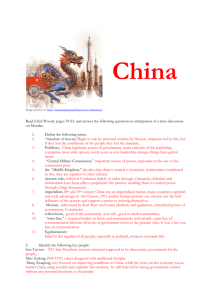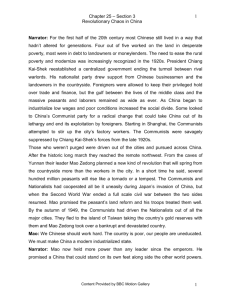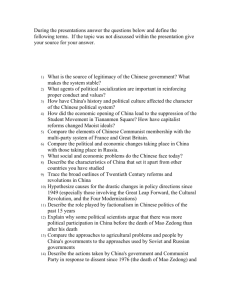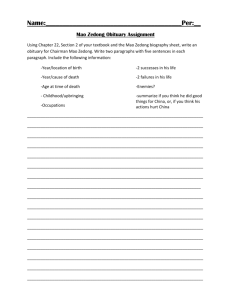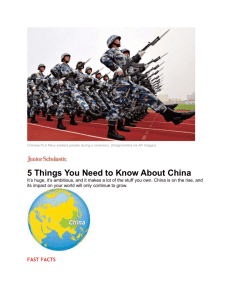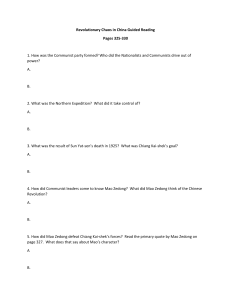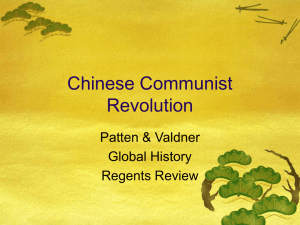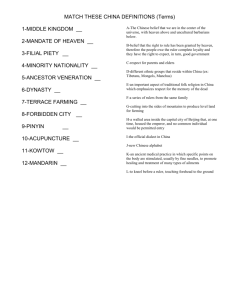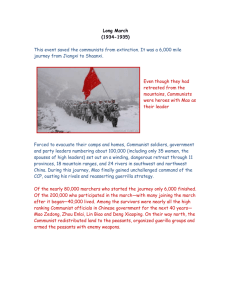File - AP Comparative Government
advertisement
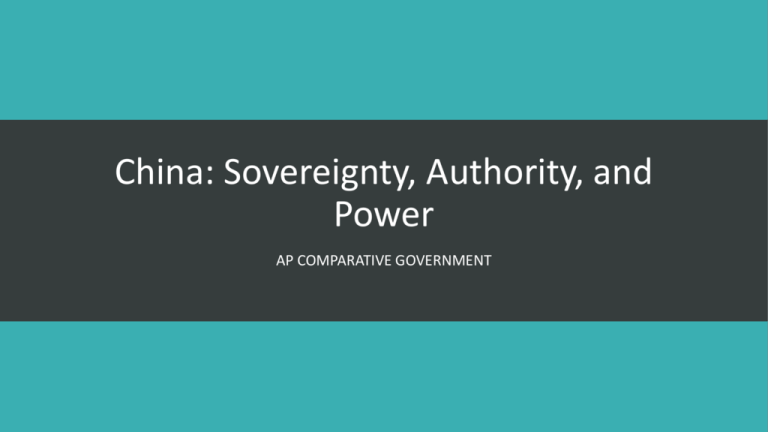
China: Sovereignty, Authority, and Power AP COMPARATIVE GOVERNMENT History • Until the 20th century, China’s history was characterized by dynastic cycles • • The legitimacy of ruling families was determined by the idea of a mandate of heaven • • • China’s history is dominated by long periods of rule by royal families which are ended by times of chaos It was believed that the right to rule was determined by a collective ancestral wisdom that guided the empire from the heavens above Early Chinese history was dominated by an emperor who wielded supreme authority who delegated power through an elaborate bureaucracy In 1949 Mao Zedong took control of China and brought forth a regime with values that disagreed with traditional power • • China is technically governed by a constitution that grants formal authority to both party and state executive and legislative offices The true power in Chinese government lies in an authoritarian elite that is not bound by the rule of law • Because of this, the constitution has very little true authority or legitimacy Legitimacy • Under dynastic rule, Chinese civilizations were subjects of the emperor. These emperors claimed authority through a mandate from heaven • This mandate of heaven is further extended through hereditary connections • • The revolution of 1911 ended traditional dynastic rule and brought about the Chinese Republic • Sun Yat-sen, who was western educated, became the first president of the Chinese Republic • • • With good times came further support. When problems occurred the legitimacy of the ruler was challenged and rulers were sometimes overthrown by rival families. This regime was supposed to be democratic, with legitimacy resting on the belief of popular sovereignty The power of the government was quickly challenged by warlords seeking power. The government was then taken over by Mao Zedong Mao Zedong established his own version of authority known as Maoism • With this, the People’s Republic of China was established in 1949 and Mao led the Communist Party as the source of power until he died in 1976 Legitimacy • Mao stressed the importance of staying connected to the needs of the peasants, even though the country was led in a top down manner • In order to stay connected to the peasants, Mao used a program called mass line • • With the death of Mao, the Politburo of the Communist Party became the legitimate source of power in China • This style of government is contrasted with the ever increasing use of a market based economy throughout China • • • Mass line required leaders to listen to and communicate with ordinary people and determine their needs There is a major contrast between the social repression that exists in China as compared to the free-market concepts pushed by the Chinese government. Even though there are challenges to the regime, most famously in Tiananmen square, there is little real fear that the regime will be overthrown One important source of power in China is its military • The Central Military Commission and its head play an important role in policy making • The Central Military Commission also helped the People’s Republic of China rise to power Historical Traditions • There are many traditions from the dynastic era that influence the modem political system • Authoritarian power: • • Confucianism: • • Even in the times of the dynasties, China has attempted to rule through a central power. This rule has always been challenged due to the large land mass of China and its tendency to be attacked by rivals. These attacks have further cemented China’s desire to rule centrally. This philosophy urges people to submit to the emperor’s power and reinforced the emperor’s responsibility to fulfill his duties. Democratic centralism has strong ties to this philosophy as well. Confucianism does however contradict communist principles, as it celebrates unequal relationships Bureaucratic hierarchy based on scholarship: • Bureaucracies play a huge role in Chinese government and are filled with elite workers based upon Confucian scholarship. Tests are administered to gauge one’s knowledge of the government and the knowledge of Confucianism and related philosophies Historical Traditions • The Middle Kingdom: • • The Chinese refer to their land as zhong-guo, or the middle kingdom • Foreigners were seen as barbarians whose civilizations were far inferior to China’s in every way • These ideas were challenged by imperialist nations who colonized portions of China Communist ideologies: • The Chinese version of communism sought to combine the “right thinking” and moralism of Confucianism, with the egalitarian ideals of communism. Confucianism and Maoism Confucianism Maoism Mandate of Heaven (responsibility of ruler to the people) Democratic Centralism (responsibility of ruler to the people) Vision of an ideal society based on harmony and obedience Vision of ideal society based on self reliance and struggle Hierarchical social and political organization; rulers and subjects have unequal positions Egalitarian social structure; mass line between rulers and subjects Emphasis on loyalty to family Emphasis on loyalty to the state, Mao Geographic Influences • China has the largest population of any country on earth and it has the third largest land mass after Russia and Canada • • They have: • Access to oceans/ice free ports • Many large navigable rivers • Major geographical/climate splits between north and south • Geographic isolation of the western part of the country • Mountain ranges, deserts, and oceans that separate China from other countries Many of these land features have shaped Chinese development. These land features haves isolated them from much of the world, allowing them to develop a distinct culture Historical Eras • Dynastic Rule: • The political culture of China stems from the dynastic tradition of Confucian values • • These values center on order, harmony, and a strong sense of hierarchy • Scholarship is looked at as a way of establishing superiority and as a way of filling governmental positions • China is also extremely ethnocentric, feeling that their culture is superior to others Resistance to imperialism • China practices strong nationalism and has been very hesitant in dealing with imperialist nations • In the Revolution of 1911, the hatred of the “foreign devils” led China to be cautious and suspicious of capitalist nations Historical Eras • Maoism: • Mao Zedong was strongly influenced by Karl Marx and Vladimir Lenin • Mao resisted the inequality implied in Lenin's beliefs and felt that the strength of the peasant was important and his beliefs centered on the following: • Collectivism: The good of the community is valued above that of the individual • Struggle and activism: Mao encouraged people to actively pursue the values of socialism which he knew would require struggle and devotion • Mass Line: This was a line communication between party leaders, members, and peasants that would allow all to struggle toward realization of the goals of a communist state • He believed that this required teaching and listening on everyone’s part • Egalitarianism: Hierarchy was the key organizing principle in Chinese society before 1949 and Mao emphasized the creation of an egalitarian society was in opposition to this • Self-reliance: Instead of relying on elite to give directions, people were encouraged to rely on their own talents Historical Eras • Deng Xiaoping Theory: • This is the belief that it didn’t matter if a policy was capitalist or socialist, as long as it was making the economy better • His political and social views remained true to Communist tradition in that: • • The party should supervise all • No allowances should be made for individual freedom and/or democracy Deng Xiaoping’s famous quote regarding this theory is, “It doesn’t matter whether a cat is white or black, as long as it catches mice.” Informal Relationships • In China, it is not so much your job title that establishes your importance, but the connections you have to others who have power • Many of these informal relationships are were based upon the Long March which took place between 1934-1936 • This was a cross country march that was led by Mao as they tried to escape the nationalist army • Factions of the leaders of the Long March still exist today and compete for power within the government • The network of power exists in a patron-client system • When new leaders come to power, it isn’t easy to predict how policymaking will be affected, but who they have relationships can provide a window to how they will act Nationalism and Attitudes Towards the West • The Han Chinese dominate the ethnic makeup of China • • The Han culture goes back centuries and the pride in that culture is found throughout modern China Despite Mao encouraging China to isolate themselves from the outside world, China has become increasingly involved in world politics and trade. • • The 2008 Olympics were held in China and brought along international criticism of Chinese policies • • Mao’s call for insularity was largely due to large portions of China being carved into colonies during the 19th century. China has had increased involvement in world politics since their economy has exploded in the late 20th and early 21st century. Pro-Tibetan news coverage caused outrage in many parts of China China has also become part of the G-20, a meeting of the 20 largest national economies • • China’s involvement has had mixed reviews within the country Economic success has brought more nationalistic pride in the country

